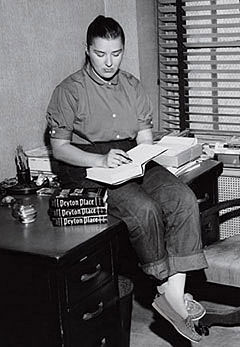 |
 |
| current issue |  | past issues |  | send a letter/news |  | address update |  | advertise |  | about us |  | alumni home |
Web Extras
|
Revisiting Peyton Place
The New Hampshire author, wife of a UNH alumnus, is known for writing Peyton Place, but she should be recognized for advancing the rights of children By Tammi J. Truax '85 |
Easy to print version |
 |
There is a longstanding wrong that needs to be righted and I think UNH alumni, along with America's sweetheart Sandra Bullock, can get the job done. I am referring to the unfairly harsh and hateful maligning of New Hampshire author Grace Metalious. She not only did not deserve to be vilified the way she was, she deserves accolades for her writing and the profound positive impact it made toward social change over the last 50 years.
Metalious (1924-1964) became famous for her rather infamous novel Peyton Place, which was published in 1956. Metalious wrote her novels, especially Peyton Place, her first, in response to what she saw while growing up in New Hampshire. The rest of her life was heavily influenced by the world's reaction to it—a reaction that was so big it can be compared to few other novels. Uncle Tom's Cabin comes the closest. The book reaped either intense outrage or empathy, and was followed by substantial commercial exploitation that included strange film and television adaptations that were also quite popular. But Metalious was not treated with the respect that Harriet Beecher Stowe was. The reaction to her and her book was intensely critical and punitive, from the central lakes region of New Hampshire, rippling out across the country and beyond.
It is perplexing that the very thing she sought to expose, the harsh dismissal of people perceived as different (what sociologists call marginalization), especially while posing as pious, the harmful effects of a prejudiced and patriarchal society, was in turn the force that snubbed her work and sullied her reputation as a writer, and as a person.
Metalious was born Marie Grace de Repentigny in Manchester, N.H., of first-generation Franco-American parents. She lived in many different apartments throughout the city as her mother tried to pass for another ethnicity. Her parents divorced when she was 11. She also lived with her French-speaking grandmother and a sister. Coming from a "broken home," especially in a Catholic enclave, was rather scandalous in those days. By the age of 17 she was pregnant and married a neighborhood boy. Again scandalous, but not particularly uncommon in the '40s. What was uncommon, and beyond scandalous, was that she lived with her boyfriend before marriage. Consent to marry was withheld for a while because the marriage crossed both religious and ethnic lines. Her boyfriend was Greek. As benign as this sounds now, in working-class Manchester it was considered ruinous.
Controversial writing must have been in her bones, for Metalious began writing in the fourth grade and received a reprimand for her very first story for writing about a brother who didn't exist. Another controversy came in high school for a play she wrote that was not appreciated. At the very least, she had an inherently rebellious nature because she simply didn't conform to the expectations imposed on her by society. She was keenly cognizant and observant of the subtle social hypocrisies and taboos of her childhood and early adulthood that were accepted by others as normal and necessary, if considered at all. This was more than unusual for a female, who felt a powerful pressure from every direction-- home, school, church--to behave in very specific ways. From her teenage years on Metalious lived, dressed and wrote the way she wanted to, which was often in stark contrast to expected norms.
She began writing seriously after moving to Durham. She and George '51 moved here with their first baby so that he could earn a degree in education on the GI Bill. Though three more babies would follow, she concentrated her time and energy on her writing when to do so was very negatively reinforced. She was often accused of being a bad housewife and mother, and certainly by the standards of the day, she was. Perhaps even by today's standards. It has been reported that the only clean spot in her Gilmanton home, which itself was a rundown old house that didn't always have running water, was where she kept her typewriter. In the age of pumps and pearls for everyday housewifery, she was well known for wearing men's flannel shirts and was nicknamed "Pandora in Blue Jeans" when she became famous. She was a heavy smoker and drinker, and was said to swear like a sailor. It is impossible to accuse her of being guilty of the social hypocrisy that her books would expose.
Page: 1 2 3 4 Next >
Easy to print version
blog comments powered by Disqus

